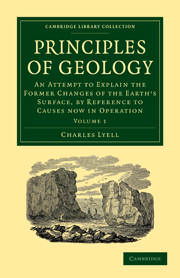 Principles of Geology
Principles of Geology Book contents
- Frontmatter
- Contents
- LIST OF PLATES AND WOOD-CUTS IN THE FIRST VOLUME
- CHAPTER I
- CHAPTER II
- CHAPTER III
- CHAPTER IV
- CHAPTER V
- CHAPTER VI
- CHAPTER VII
- CHAPTER VIII
- CHAPTER IX
- CHAPTER X
- CHAPTER XI
- CHAPTER XII
- CHAPTER XIII
- CHAPTER XIV
- CHAPTER XV
- CHAPTER XVI
- CHAPTER XVII
- CHAPTER XVIII
- CHAPTER XIX
- CHAPTER XX
- CHAPTER XXI
- CHAPTER XXII
- CHAPTER XXIII
- CHAPTER XXIV
- CHAPTER XXV
- CHAPTER XXVI
- INDEX
- Frontmatter
- Contents
- LIST OF PLATES AND WOOD-CUTS IN THE FIRST VOLUME
- CHAPTER I
- CHAPTER II
- CHAPTER III
- CHAPTER IV
- CHAPTER V
- CHAPTER VI
- CHAPTER VII
- CHAPTER VIII
- CHAPTER IX
- CHAPTER X
- CHAPTER XI
- CHAPTER XII
- CHAPTER XIII
- CHAPTER XIV
- CHAPTER XV
- CHAPTER XVI
- CHAPTER XVII
- CHAPTER XVIII
- CHAPTER XIX
- CHAPTER XX
- CHAPTER XXI
- CHAPTER XXII
- CHAPTER XXIII
- CHAPTER XXIV
- CHAPTER XXV
- CHAPTER XXVI
- INDEX
Summary
We defined geology to be the science which investigates the former changes that have taken place in the organic, as well as in the inorganic kingdoms of nature; and we now proceed to inquire what changes are now in progress in both these departments. Vicissitudes in the inorganic world are most apparent, and as on them all fluctuations in the animate creation must in a great measure depend, they may claim our first consideration. We may divide the great agents of change in the inorganic world into two principal classes, the aqueous and the igneous. To the former belong Rivers, Torrents, Springs, Currents, and Tides; to the latter, Volcanos and Earthquakes. Both these classes are instruments of decay as well as of reproduction; but they may be also regarded as antagonist forces. The aqueous agents are incessantly labouring to reduce the inequalities of the earth's surface to a level, while the igneous, on the other hand, are equally active in restoring the unevenness of the external crust, partly by heaping up new matter in certain localities, and partly by depressing one portion, and forcing out another of the earth's envelope. It is difficult, in a scientific arrangement, to give an accurate view of the combined effects of so many forces in simultaneous operation; because, when we consider them separately, we cannot easily estimate either the extent of their efficacy, or the kind of results which they produce.
- Type
- Chapter
- Information
- Principles of GeologyAn Attempt to Explain the Former Changes of the Earth's Surface, by Reference to Causes now in Operation, pp. 167 - 182Publisher: Cambridge University PressPrint publication year: 2009First published in: 1830


